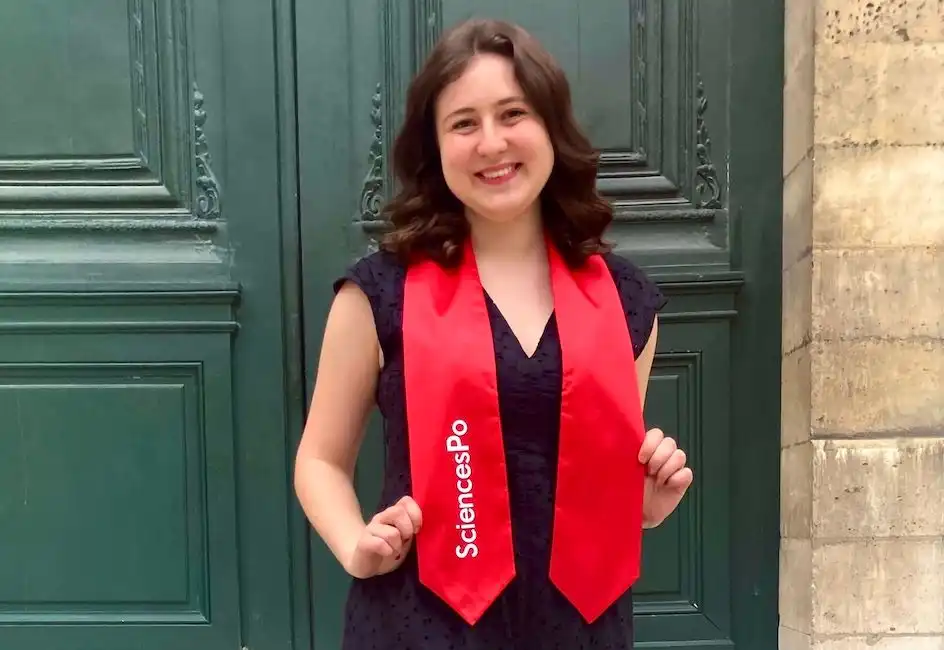Home>Meet the Graduates 2024: Dominique Mickiewicz
22.07.2024
Meet the Graduates 2024: Dominique Mickiewicz
Originally from the United States of America, Dominique Mickiewicz began studying gender studies during her undergraduate studies at Wellesley College, located outside the city of Boston, Massachusetts. She chose to continue this path at Sciences Po, where she completed a master's degree in International Security and the Advanced Certification in Gender Studies.
What brought you to study gender issues?
Gender as academic specialisation and personal passion has always been an essential and inseparable component of how I want to craft my future career. I chose to pursue the Advanced Certification in Gender Studies alongside my master in International Security because I recognised I was entering a historically male-dominated field and strived to the harness tools offered by Sciences Po’s Gender Studies Programme to tailor my coursework to include marginalised perspectives and to forge connections with gender specialists, both peers and professors, during my time at Sciences Po.
My work related to the Advanced Certification represented a space of both community and confidence-building. Through my gender studies specialisation, I aimed to complement my master’s curriculum with courses that would build both my practical competencies and confidence to raise gender considerations in my classes on security issues and in professional experiences. As my time as a Sciences Po student concludes, I am proud to look back at how the Gender Studies Programme facilitated an interdisciplinary community for me that I feel comfortable turning to post-graduation for future advice and support.
Did any course leave a lasting impression on you?
One of my favourite courses at Sciences Po was entitled “Women’s Fight for Human Rights Protection and Resistance Against Violence” graciously co-taught by Alexandra (Sacha) Koulaeva and Tchérina Jerolon which I completed as a capstone to my gender studies concentration during my last semester at the School of International Affairs (PSIA). It was a standout course not only for its content centred on women’s activism, but for its interdisciplinary structure. The professors skillfully wove together practical lessons with guest lecturers from accomplished individuals, vividly connecting the dots between gender theory and practice. Students were also given the liberty to shape our own learning in the course by applying our diverse interests to the frame of “Women’s Resistance”. For me, this meant melding my political and artistic passions by researching the mobilisation strategies of the Guerilla Girls art collective which materialised into a final paper entitled “The Art of Activism: Problematising Power and Representation through the Gendered Artistic Lens of the Guerilla Girls Movement.” Art is probably not the first place one would think to look when investigating resistance and human rights through a gendered lens. However it was courses like this one that, through a multidisciplinary approach, helped me expand my definitions of concepts like resistance and violence to consider new avenues and pressure points for activism and change.
What would be your best memory from your time at Sciences Po?
Community and crêpes are two components at the heart of one of my favourite Sciences Po memories! As a first-year master student, I was enrolled in the course “Gender Equality in Sustainable Economies” taught by Eva Bernard. Centred on the topic of gender mainstreaming, it was a dynamic and collaborative class with one tiny flaw… it was held for 4-hours on friday nights, which as my friends were quick to point out conflicted with the Parisian happy hours. However, the late timing of the course proved to be perfect for facilitating community-building beyond the classroom. A special moment included going out to a crêperie for dinner with my peers and professor after class one evening, where we got to laugh and talk more casually around really good food. After that outing, the classroom seemed to be filled with more familiar faces which motivated me to dig deeper into group work and discussions, and ask for candid advice when it came to looking for my third-semester internship and registering for future classes.
Can you offer any tips to the next generation of graduates?
Say hello to your seat neighbours in class! The community in the gender studies cohort is so fruitful, but you don’t have to feel overwhelmed at the prospect of meeting everybody. Some of the connections you will make through a simple hello to those who randomly choose to sit next to you might surprise you. One of my “seat neighbour surprises” happened when I saw a classmate sitting next to me with a sweater from Wellesley College, the small university I attended for my undergraduate studies. A quick hello later and I learned that not only had she been an exchange student there a year after I graduated, but that we both lived in the same residence complex and shared a few friends and professors! Throughout my two-years at PSIA, I found that saying hello to those around me made going to class more fun, and enabled me to have more frank and open discussion once my peers and I realised we were all learning together. Being the first one to say hi can be nerve-wracking, but I promise…those around you want to talk to you too!
What is next for you?
After taking a bit of time to celebrate my graduation, I hope to make my next professional steps in the European Union as I make Paris my home-base during my job-search oriented towards gender departments and programmes in the international organisations and non-governmental organisations landscape.
MORE:
- The Advanced Certification in Gender Studies
- The Master in International Security is offered at the School of International Affairs (PSIA)
